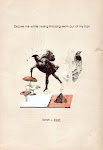Mr. Swayze was a balletically athletic actor who rose to stardom in the films “Dirty Dancing” and “Ghost,” and whose battle with pancreatic cancer drew wide attention. – NYT
Balletically? Is this a word? I guess it is now. But it’s a goofy word and I promise not to use it. I’m sure the French won’t touch it either. I’m with them. What’s really sad about this supposed word is you are now forced to pronounce the /t/. Ballet. This is wrong.
Are you balletically inclined? Balletically oriented? Balletically pathetic?
I asked my colleague Geoff if balletically is a word. He assured me balletic is a word, but that balletically is not. I didn’t want to believe it, but Webster’s backs him up on both counts. Another online dictionary acknowledges balletically. Either way, I agree with Geoff when he says: “The question is not whether it’s a word. The question is whether or not the NYT can’t express it less awkwardly.” Thank you, Geoff. (Who then sheepishly added, “I guess he had the time of his life,” and ran off.)
It’s no surprise that words morph, and what was a noun is suddenly a verb (I knifed him) and vice-versa (That’s a miss), which then becomes an adjective (The poem is wordy), then the adjective becomes an adverb (just add -ly), or an adjective becomes a noun (My bad!) and so on. The surprising thing in terms of balletically is this usually happens at the vernacular level through the speech of ordinary people. Who are not often discussing ballet.
Tuesday, September 15, 2009
Subscribe to:
Post Comments (Atom)




9 comments:
He assured me balletic is a word, but that balletically is not.
I'm not sure that even makes sense, you know. If 'balletic' is a word then surely it follows inevitably that 'balletically' is also a word. English has somewhat regular rules for the formation of adverbs from adjectives, and adjectives ending in '-ic' can be freely made into adverbs ending '-ically'. Like pathetically, academically, manically, frantically...
It’s no surprise that words morph. [...] The surprising thing is this usually happens at the vernacular level through the speech of ordinary people.
Actually, why is this surprising? If it is part of the normal behaviour of language, which it is, why would it not be happening all the time in the speech of ordinary people, which is after all the commonest form of language? if anything, ordinary people have the advantage that they're not silly enough to allow the dictionary to dictate how they use words.
Hi Harry,
What I meant was it isn't surprising because ordinary people are more flexible about what's linguistically acceptable and what's not. I would expect people who use words like balletic to be less daring. So I think we agree there? I guess the whole sentence should be "The surprising thing is this usually happens at the vernacular level through the speech of ordinary people and not at higher, more formal levels (by people who use words like 'balletic')."
And yes, most adjectives are easily and often immediately transformed into matching-set adverbs but I don't think this is always the case, or inevitable. In general a dictionary will give both the adjective and adverb form if they are "recognized" words. My dictionary at work, for example, shows "parenthetically" as the adverb form at the end of the entry for "parenthetical." Under "balletic" it gives no adverb form. I don't think this is random, but certainly there's nothing to stop anyone from turning "balletic" into an adverb, and as I mentioned another dictionary I looked at does acknowlege "balletically" as a word.
I'm for outlawing all adverbs. Period.
then you are an adversary
When rules for language are applied to form words that don't exist it's called back forming. I suppose there's an argument that the word exists in some realm but not in common usage.
I'm so inartful in language use that I'm wary to post this. But it's in stone already.
I think your comment on an NYT editor not finding a better way of saying it, says it all.
A word I've seen used a lot lately and that I hate is incentivize.
You're right Sarah, I tried the word out this morning at work. No one knew what the hell I was talking about when I pronounced the word balletically as part of the NYT obit sentence. The spoken t. Why can we not be capricious and say ba-lay-ick-ly? Or as someone else said, why not simply: "Mr Swayze could dance like a m*th*r f*ck*r." Formal meets informal. Maybe Balletics will overtake Pilates as the word on every twisting person's lips.
Ron -
I've never seen him dance. I don't really like his looks, but my interest is piqued.
Bob -
I love the -ize suffix. "Incentivize" is way out there. I'm sure I couldn't even pronounce it properly under duress.
Also, it doesn't describe Mr. Swayze. They had twenty months to prepare the obituary and it seems something like "graceful dancer" or his own choice, "dirty dancer" are a better choices.
It's true. Obits are prepared way in advance. I worked with a news agency in Rome once, and they had the last pope's obit ready and waiting for years.
Ron - come to think of it, maybe it IS pronounced bal-lay-ik-ally. I've no idea, never having pronounced it!
Post a Comment